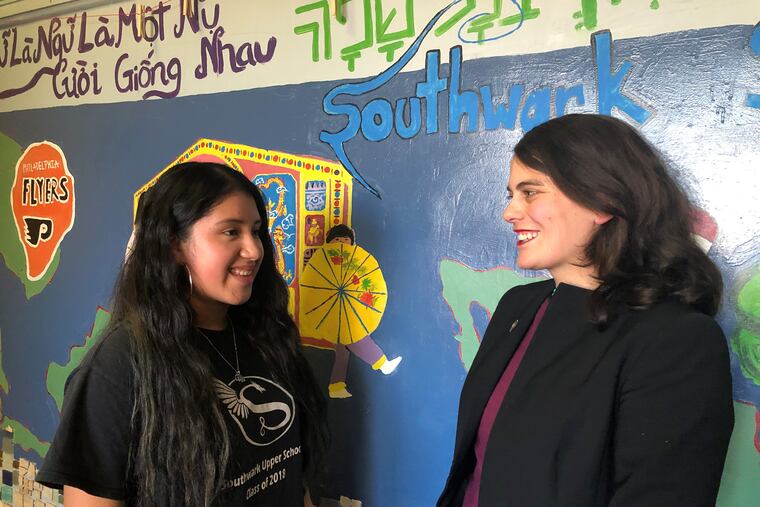After closures from asbestos and other hazards, Pa. and Philly schools need emergency repairs | Opinion
As a state representative who has heard too many heartbreaking stories from students in my district., and as a mom of two children under five, fixing our schools is one of my biggest priorities.

Imagine being forced to go into a building five days a week where you might get brain damage because of chipped lead paint, or cancer because of exposed asbestos — a chemical that, as of Dec. 17, has shut down four Philadelphia schools this year.
That’s the daily reality of students across Pennsylvania who are paying the price for decades of disinvestment in education. Schools are supposed to be setting kids up for a bright future full of possibilities. Instead, these crumbling facilities are making students sick.
It shouldn’t be this way. All children deserve to go to school knowing they will get to learn with the educators and support staff they need, in a safe and healthy building. Where they live, what they look like, or how much money their parents make shouldn’t determine the conditions they learn in. These are the basic civil rights we were all promised, and we can’t wait any longer. Every day that passes with no action is another day students and staff are being put in danger.
As a state representative, and as a mom of two children under 5, fixing our schools is one of my biggest priorities. That’s in part because I’ve heard too many heartbreaking stories from students in my district.
Daisy Rios, who has gone to Southwark from kindergarten to eighth grade, is one of those students. She had to go to school for years with paint chipping off the walls that could poison her. She feels unsafe, as if the adults who let this situation continue don’t care about her. Last year, the lead was finally stabilized. But other big problems continue. In the winter, students sometimes get nose bleeds, nausea, and anxiety because the heating doesn’t just warm up the students and staff, it leaves them feeling as if they’re roasting. Given those conditions, students can’t focus and it’s hard for educators to as well. Daisy told me she eventually wants to study law at Temple University, and she shouldn’t have to put her health at risk to get there.
This past September, I hosted a Policy Committee hearing at Furness High School. Temperatures reached into the 90s on the stage where lawmakers sat, wiping sweat from their foreheads. For the students in the auditorium seats, the extreme temperature was old news. It was there I first met Kane Esasta, a Furness senior who will study pre-physical therapy at Cheyney University in the fall. He described the lead and asbestos that are still in the building as well as no air-conditioning, bathrooms without locks or lights, and broken sinks. During hotter months, teachers in classes without air-conditioning have to share classrooms with A/C. That has meant literally sharing one room with two full classes and teachers speaking about two different topics at the same time. Kane poignantly asked, “How do the adults expect us to stay in school and learn under these oppressive conditions?”
» READ MORE: With news of Philly teacher getting sick from schools, Penn should step up | Opinion
And it’s not just schools in my district. Students across the state are being forced to sit in toxic school buildings. According to the teachers’ union, more than 1,000 school building issues have been reported using the Philadelphia Federation of Teachers’ Healthy Schools Tracker app. Educators, parents, and community members have used the app to photograph and report problems in their schools ranging from air quality and rodents to damaged asbestos and flaking lead paint.
Elected officials in Harrisburg know how to fix this: Invest money to get the lead, asbestos, and other toxic elements out of every school building, make sure the work is done by qualified professionals, and verify that basic building functions like heat actually work correctly.
To make this happen, State Sen. Vincent Hughes and I have introduced Emergency School Repair legislation outlining the urgent need for $125 million in immediate funding for repairs. The state has the financial ability to fix our schools. Now, we need to make people’s lives a budget priority.
That’s why hundreds of students, teachers, and community members gathered today in Harrisburg to call for emergency funding through the passage of our bill or in the budget. Getting this funding won’t be the end of our fight for dignity and respect, but it’s a step in the right direction.
State Rep. Elizabeth Fiedler serves South Philadelphia’s 184th District in the State House. She is in her first term as a lawmaker. She is the mother of two young children, who will soon spend their days inside a Philadelphia public school.